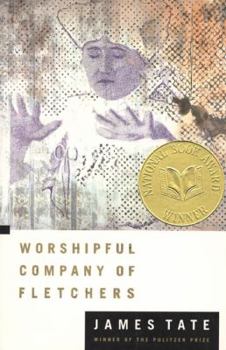Worshipful Company of Fletchers
Select Format
Select Condition 
Book Overview
Masterfully drawing on a variety of voices and characters, James Tate joyfully offers his first book since winning the Pulitzer Prize in 1992 for his Selected Poems.
Format:Paperback
Language:English
ISBN:0880014318
ISBN13:9780880014311
Release Date:December 1995
Publisher:Ecco Press
Length:96 Pages
Weight:0.24 lbs.
Dimensions:0.3" x 5.5" x 8.3"
Customer Reviews
4 ratings
And again, and again, and again...
Published by Thriftbooks.com User , 16 years ago
Over and over I return to this, one of Tate's most powerful collections. In "Worshipful Company of Fletchers", the poems possess that convincing and captivating power to not just construct their own world , but to play within it and stretch the rules of their own making. In the poems, Tate's perceptions and insights make complete sense, and when applied outside the bounds of Sigmar Polke's beautiful painting on the cover, the poignancy of this work resounds even louder. It's often that I return to this collection seeking that artfully piercing insight of Tate, and I am never disappointed.
Required Reading
Published by Thriftbooks.com User , 16 years ago
In James Tate's post-Pulitzer volume, "Worshipful Company of Fletchers," he presents a collection of lyric poetry that offers a constant sense of movement, as though he is guiding readers on a series of speculative journeys with the promise that we could wind up...anywhere. Reading Tate requires trust - trust that his "auto-suggestive" flow of language and ideas will result in a payoff - and it does...there is a payoff of discovery within these pages, his poems. In "Porch Theory," for example, he provides the familiar image of a porch, yet in this fairly short poem, we discover that the porch represents several generations of a family. Like his other works, this piece boasts an effective flow. There are wonderfully warm images of ghost stories, rainy nights, children sleeping, the physical sagging of the porch itself, dinner parties, a sleeping uncle, a playful pet and cocktails being served. Importantly, Tate repeats the visual of wicker across the stories of each generation, tying it with the actions of his characters on the porch: "More children / climb on the wicker couch, and grandmother / stares at the croquet set / in the corner, remembering the parrot / her grandfather brought back from the Pacific." This is important because we realize the wicker is permanent, yet the porch's inhabitants are not. We come to understand that Tate's "Porch Theory" is symbolic of life and death, but that he is celebrating the sense of immortality achieved with the arrival of new generations. This becomes evident midway through the poem with the lines, "The willow itself is finally dying...`Look at those clouds,' / someone says. `The face of God is in there, somewhere.'" Regardless of an individual reader's spirituality, Tate's intention is clear. This is a poem of hope, and it carries the sense of movement and speculative journey that ties it with other poems throughout the book. While "Porch Theory" takes place in the setting of one family's porch, it achieves the promise that we could indeed wind up anywhere because so much occurs within - from its ghost stories to its cocktails and, ultimately, in the memories of the grandmother. Through her, we don't "wind up" on the porch at all, but with the visual of a parrot in transit from the Pacific. This is the payoff. It is why we trust a poet with Tate's intuition and talent, and it is as rewarding as an afternoon of daydreaming on the porch.
"The Nitrogen Cycle"
Published by Thriftbooks.com User , 24 years ago
This book is the key to the closet, where we keep everything that we never use and rarely want. Tate has a keen gift of putting a tear in one eye and a wrinkle in the other. This is where he is most commonly misunderstoond. A friend of mine, after reading Tate's latest book told me that he felt the poet was merely trying to show how silly and zany that he could be. His poems are often funny and even absurd, but there is a painful sadness hidden in them. "The Nitrogen Cycle" puts a smile on your face. But, the next minute you are pondering the frail nature of the human mind. This book should be read with plate of cookies and dull knife.
Tate will one day be seen for his incredible talent, we hope
Published by Thriftbooks.com User , 26 years ago
The thing that makes me laugh is that Tate has one of the most unique and insightful ways of looking at the world, and yet he is read so very little. It's a classic case of the public at large not catching on to what is really happening in this world. This book in particular shows a wealth of maturity in his work that didn't really show up until the Eighties. He is able to sythesise the forms of speech that people use to plump themselves up so well that you can only identify with him as a fellow observer. In particular, the poem 'I Got Blindsided' is a high point. While the field of study into Tate's work may be a little sparse now, I believe that he has the skill and attention to the details of American life which will make him one of the truly great writers to come out of the age of the hippies.





